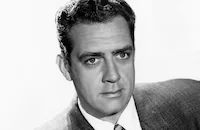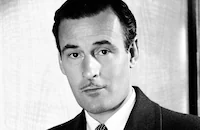Tarzan and the She-Devil

Brief Synopsis
Cast & Crew
Kurt Neumann
Lex Barker
Joyce Mackenzie
Raymond Burr
Monique Van Vooren
Tom Conway
Film Details
Technical Specs

Synopsis
In an African jungle, while their native porters lug a load of elephant tusks to the city of Dagar, ivory hunters Vargo and Philippe Lavar discuss their next, big excursion. Having located an enormous but dangerously remote herd of elephants, Lavar and Vargo plan to capture and enslave members of the sturdy Laikopos tribe, then force them to carry the valuable tusks. While Lavar takes off to track the herd and establish a camp, Vargo continues to Dagar to deliver the tusks to Lyra, an exotic, rich French woman, and her husband Fidel. Hoping for financial backing, Vargo tells Lyra and Fidel about the herd and the proposed enslavement. Although Fidel declares Vargo's scheme preposterous, Lyra is intrigued and orders her right-hand man Maka to organize the expedition. After the Laikopos men are captured, the women rush to tell their friend Tarzan and his wife Jane about the kidnapping. Tarzan and his companion, chimpanzee Cheetah, leave immediately for Dagar and, while Vargo's men are distracted by a seductive dancer, knock out some of the guards, steal a stash of rifles and free the Laikopos. As they are sneaking away, however, they are spotted, and a brawl ensues. Although Tarzan and the Laikopos eventually escape, Lyra leads her own expedition to track them down. After finding Tarzan at home, Lyra tries to hire him to guide the doomed elephants into her traps, but Tarzan orders her away. Later, in Dagar, the determined Lyra instructs Vargo to raid the Laikopos again, confident that Tarzan will come to their aid and leave Jane unprotected. Fidel then is to kidnap Jane and hold her until Tarzan gives in to their demands. As planned, Vargo and his men recapture the Laikopos and Tarzan, but Fidel cannot subdue Jane. During the ensuing fight, an oil lantern is knocked over, and the treetop house is engulfed in flames. Jane flees in the confusion, but soon collapses in a daze. Tarzan, meanwhile, frees himself and races home, only to discover his house destroyed and Jane apparently dead. Grief-stricken, Tarzan offers no resistance when Vargo's men come for him. Nearby, a revived Jane struggles toward the Laikopos village, but after being menaced by crocodiles and snakes, falls unconscious again. A passing elephant sees her and carries her in his tusks to the village, where the women take her to the tribal medicine man. In Dagar, meanwhile, Vargo whips the emotionally numb, chained Tarzan, trying to rouse him, but Tarzan barely reacts to the beating. Even the resourceful Cheetah fails to stir Tarzan to action. Soon after, Vargo, Fidel and their enslaved porters return to the jungle and eventually arrive at Lavar's camp. Meanwhile, in the Laikopos village, Jane is nursed back to consciousness and, when she wakens, calls out for Tarzan. At the same moment, a sleeping Tarzan also wakens and loudly cries Jane's name. As punishment for his outburst, Vargo puts Tarzan alone in a pen and denies him food and water. Later, as the Laikopos are building huge pens to house the elephants, Fidel leaves to do some hunting, and his rifle shots cause the animals to stampede. Furious, Vargo demands that Fidel return to Dagar, but just before Fidel departs, he overhears Vargo and Lavar plotting to steal his and Lyra's share. In Dagar, a fully recuperated Jane confronts Lyra, who informs her that Tarzan is deep in the jungle. Jane hurries off to find Tarzan, and after Lyra learns about Vargo's betrayal from Fidel, decides once again to imprison Jane to get to Tarzan. Jane is soon captured and taken to the still-grieving Tarzan in camp. Lyra then tells Tarzan that if he wants to see Jane again, he must lead the elephants into the pens. Though Tarzan at first appears to be cooperating with Lyra, he calls the elephants in a way that makes them stampede toward the camp. In the ensuing panic, Tarzan frees Jane, while Fidel accidentally shoots Lyra. After Fidel, Vargo and Lavar are trampled to death by the elephants, Tarzan and Jane embrace, as a happy Cheetah looks on.

Director
Kurt Neumann
Cast

Lex Barker

Joyce Mackenzie

Raymond Burr
Monique Van Vooren

Tom Conway
Michael Grainger

Henry Brandon
Robert Bice
Cheetah, A Chimp
Crew
Leon Barsha
Carroll Clark
Emmett Emerson
Audray Granville
Wesley V. Jefferies
Karl Kamb
Sol Lesser
Jay Morley Jr.
Gustaf M. Norin
Lloyd Richards
Paul Sawtell
Jean L. Speak
Karl Struss
Carroll Young

Film Details
Technical Specs

Articles
Tarzan and the She-Devil
Working titles for Tarzan and the She-Devil included Tarzan and the Ivory Thieves and Tarzan and the Vampire. (Viscount Greystoke had encountered a more literal vampire queen and her toothy minions in the Sunday funny pages in 1946, in 17 thrilling chapters drawn by Reuben Moreira.) Production for Tarzan and the She-Devil got underway in mid-October 1952, with principal photography lasting four weeks. With the series' move to RKO, shooting locations for the Tarzan films had shifted from MGM's Florida locations (and the Iverson Ranch in Hollywood-adjacent Chatsworth) to the Los Angeles State and County Arboretum in Arcadia, hard by the Santa Anita Racetrack. Boasting lush vegetation, a lagoon, Baldwin Lake and the nearby profile of the San Gabriel Mountains, the 127 acre botanical garden was ready-made for jungle adventure and can be seen as well in Road to Singapore (1940), the Roots (1977) miniseries and the long-running Fantasy Island TV series. Tarzan and the She-Devil marked the fourth and final series entry for German émigré Kurt Neumann, who later directed the sci-fi classic The Fly (1958) starring Vincent Price but died between the film's premiere and general release.
Lex Barker was not the only cast member of Tarzan and the She-Devil day dreaming of brighter days. Costar Raymond Burr, cast as a villainous ivory poacher in the employ of femme fatale Monique van Vooren, was growing weary of his lot as an itinerant villain for-hire. Burr's rock-like body habitus made him a reliable "heavy" in such films as Raw Deal (1948), Borderline (1950), Meet Danny Wilson (1951) and Joseph Losey's 1951 remake of M until he was able to turn those same characteristics to his advantage as the star of the long-running TV series Perry Mason in 1957. As if to overcompensate for his onscreen villainy, Burr devoted much of his time to performing for the USO, touring military bases along the west coast in the company of his Raymond Burr Troupe of singers and musicians. He followed Tarzan and the She-Devil with a role in Fritz Lang's The Blue Gardenia (1953) at Warner Brothers before setting off on a two-week tour of military outposts and weather stations in Greenland, Baffinland and Newfoundland. Burr celebrated Christmas 1952 at a remote air force base in Labrador, singing carols with American servicemen, before setting off on a six-month tour of Korea to perform for American troops on the front lines. As for Monique van Vooren, the titled She-Devil, she would go on to achieve a belated cult status in the early seventies for memorable appearances in Pier Paolo Pasolini's The Decameron (1971), the softcore psychodrama Sugar Cookies (1973) and Andy Warhol's Frankenstein (1973).
Producer: Sol Lesser
Director: Kurt Neumann
Screenplay: Karl Kamb (writer); Edgar Rice Burroughs (characters); Carroll Young
Cinematography: Karl Struss
Art Direction: Carroll Clark
Music: Paul Sawtell
Film Editing: Leon Barsha
Cast: Lex Barker (Tarzan), Joyce MacKenzie (Jane), Raymond Burr (Vargo), Monique van Vooren (Lyra, the She-Devil), Tom Conway (Fidel), Michael Grainger (Philippe Lavarre), Henry Brandon (M'Tara, Lycopo Chief).
BW-75m.
by Richard Harland Smith
Sources:
Kings of the Jungle: An Illustrated Reference to "Tarzan" Onscreen and Television by David Fury (McFarland & Company, 2001)
"Lex Barker as Tarzan: Keeping the Pure Hero Alive" by Frederic Lombardi, Video Watchdog, issue 158, September/October 2010
Hiding in Plain Sight: The Secret Life of Raymond Burr by Michael Seth Starr (Applause Theatre & Cinema Books, 2008)
Raymond Burr: A Film, Radio and Television Biography by Ona L. Hill (McFarland & Company, 1999)

Tarzan and the She-Devil
Quotes
Trivia
Notes
The working titles of this film were Tarzan and the Vampire and Tarzan and the Ivory Thieves. The film's title card reads: "Edgar Rice Burroughs' Tarzan and the She-Devil." According to modern sources, producer Sol Lesser used footage from RKO's 1934 release Wild Cargo, a jungle documentary (see AFI Catalog of Feature Films, 1931-40), in this picture. Tarzan and the She-Devil marked Lex Barker's last appearance as "Tarzan." For more information about the series, see the entry for Tarzan, the Ape Man in AFI Catalog of Feature Films, 1931-40 and the entry for Tarzan Triumphs in AFI Catalog of Feature Films, 1941-50.














